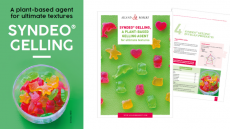Ethical 'bulge' in middle-age offers market opportunities for food brands

The study, published in the Journal of Marketing Management and based on a survey of 688 shoppers at three UK supermarkets, showed a “surprising” curvi-linear relationship between age and the purchase of fair trade, organic and non-GM foods.
The received wisdom is that people become more ethical as they get older, explained Professor Kevin Morrell from the University of Warwick, or that young consumers are more “in tune” with ethical buying and the environment.
But Morrell and his co-researchers from the Universities of Hull and Sheffield discovered the opposite is true: both older (over 50) and younger (under 30) respondents were less likely to purchase ethical goods than middle-aged ones.
As Morrell put it: “We picked up this bulge in the middle […] and we wonder whether this has been overlooked [by marketers of food brands].”
Talk the talk
More research is needed to find out the reasons why but one possibility is that middle-aged shoppers could be less price-conscious – fair trade and organic can come with a premium.
Another is that those at either end of the age scale are buying from a smaller pool of products, whilst those aged 30 to 50 may be buying for families. Or perhaps older shoppers are just more engrained in their shopping habits and less aware of the mainstreaming of some ethical options, the authors suggested.
Young people aren’t necessarily walking the walk, but they are keen to talk the talk, Morrell told FoodNavigator.
Desirability bias
People tend to want to present a nice image of themselves. As such, they answer in a manner that will be viewed favourably by others, and this appeared to be most pronounced amongst those under 30. This may be a reflection of “greater awareness” of some of these pro-social issues among younger consumers, he suggested.
Separating what consumers say they do and what they actually do has long been a headache – especially when it comes to ethics. Academics call it the social desirability bias. Morrell’s team tried to nullify this natural human bias with a questionnaire that asked respondents about both their attitudes and their behaviours.
“We asked them whether they bought one of the three categories and then what it was they bought,” Morrell explained.
The fact that young shoppers don’t buy ethical products but are happy to preach to others is also worthy of note: the cynical view is that young shoppers are hypocrites, but they could be perfect brand ambassadors, Morrell hypothesised.
The findings have implications for the merchandising of ethical products, such as fair trade and ‘green’ goods, the authors noted.
“Our work shows that values play an important part in how many consumers shop, with many aware that their buying habits can have a direct impact on people’s working conditions or the environment,” Morrell said. “Marketers need to take that into consideration and make sure it is part of their marketing mix.”
The researchers also found that “gender did not have any significant direct effects upon recommendation or purchasing of [fair trade], non-GM or organic food”.

























